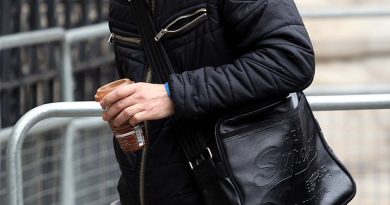Blood test could reveal the best personal breast cancer treatment for individual patients
[ad_1]
Women with advanced breast cancer may be a step closer to an NHS blood test that tells them which personalised treatment they need.
There are around 35,000 women in the UK with advanced breast cancer which has come back after treatment or spread. Girls Aloud’s singer Sarah Harding recently said she is one of them.
Around half of these women have different genetic mutations which fuel their tumours and could be stopped in their tracks with the right drugs.
![Breast cancer is not just one disease, but several types, which are fuelled by different processes in the body. A woman is seen above having a mammogram [File photo]](https://i.dailymail.co.uk/1s/2020/09/10/23/33030546-0-Breast_cancer_is_not_just_one_disease_but_several_types_which_ar-m-10_1599776951025.jpg)
Breast cancer is not just one disease, but several types, which are fuelled by different processes in the body. A woman is seen above having a mammogram [File photo]
Now the largest study to look at blood tests called liquid biopsies has found they correctly picked up 93 per cent of patients with genetic mutations. Experts say that accuracy shows the technology is close to ready for the NHS to use.
Researchers at the Institute of Cancer Research in London and the Royal Marsden NHS Foundation Trust took blood tests from 1,044 breast cancer patients, of whom 533 were found to have genetic mutations.
They were split into four groups, based on the genetic type of cancer they had, and given the drug thought best to treat them.
The results, in the journal Lancet Oncology, show that for two groups nine out of 38 saw their tumour shrink or stop growing.
This gave them up to seven and a half months of life on average without their cancer getting worse.
![The largest study to look at blood tests called liquid biopsies has found they correctly picked up 93 per cent of patients with genetic mutations. Experts say that accuracy shows the technology is close to ready for the NHS to use [File photo]](https://i.dailymail.co.uk/1s/2020/09/10/23/33031014-0-image-a-8_1599776131122.jpg)
The largest study to look at blood tests called liquid biopsies has found they correctly picked up 93 per cent of patients with genetic mutations. Experts say that accuracy shows the technology is close to ready for the NHS to use [File photo]
Professor Paul Workman, of the Institute of Cancer Research, said the findings should lead to liquid biopsies being ‘a standard part of patient care and help accelerate women’s access to the best available precision medicines.’
Breast cancer is not just one disease, but several types, which are fuelled by different processes in the body.
For example, some women have genetic mutations that produce too much of the hormone oestrogen, helping tumours to grow, while others have genetic quirks which stop them fixing faulty pre-cancerous cells.
The future for detecting these cancer-driving mutations is a simple blood test, known as a ‘liquid biopsy’.
That is because conventional biopsies, where a doctor cuts away tissue from the body, can miss mutations if they have not yet appeared or are in a different part of the tumour.
The trial, called plasmaMATCH, split women into four groups and gave 142 of them treatment to block or dial down four types of genetic mutation.
Among those with a HER2 mutation, which allows breast cells to divide too fast and become cancerous, five out of 20 responded to treatment, with one woman seeing her tumours completely disappear.
Women gained an average of almost five and a half months of life without their cancer progressing.
![Women with advanced breast cancer may be a step closer to an NHS blood test that tells them which personalised treatment they need [File photo]](https://i.dailymail.co.uk/1s/2020/09/11/00/33031472-8720507-Women_with_advanced_breast_cancer_may_be_a_step_closer_to_an_NHS-a-24_1599781625957.jpg)
Women with advanced breast cancer may be a step closer to an NHS blood test that tells them which personalised treatment they need [File photo]
In the group with an AKT1 mutation, where oestrogen was fuelling their breast cancer, four out of 18 women responded to treatment, gaining an extra seven and a half months on average.
Women in the other two mutation groups responded to treatment in some cases, but these groups did not achieve the study target of helping at least a fifth of patients.
In some cases, the drugs may not have worked because these women had received so many different treatments already, and in 12 cases they led to severe medical side effects.
But these were women for whom other treatments had failed, for whom drugs based on their individual genetic mutation were often the best hope.
Michelle Mitchell, chief executive of Cancer Research UK, which helped to fund the research through its joint Stand Up To Cancer campaign with Channel 4, said: ‘It’s absolutely fantastic that we are looking at the possibility of using a simple blood test to quickly match the best treatments for women with advanced breast cancer.
‘It’s results like these that will help us see 3 in 4 people survive their cancer by 2034.’
[ad_2]
Source link


